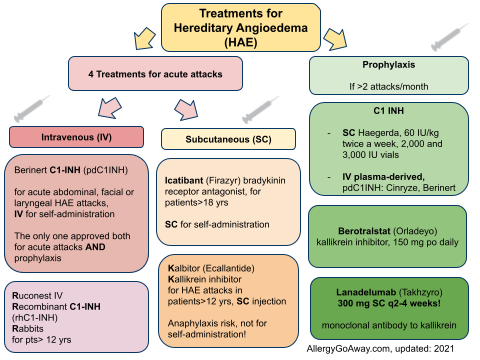The symptoms of hereditary angioedema with C1-inhibitor deficiency (C1-INH-HAE) often present in childhood but can go unrecognized for years.
Differential diagnosis can be difficult as abdominal pain is common in pediatric C1-INH-HAE but also commonly occurs in the general pediatric population.
Have in mind that before the age of 1 year, C1-INH levels may be lower than in adults; therefore, it is advisable to confirm the diagnosis after the age of one year.
All neonates/infants with an affected C1-INH-HAE family member should be screened for C1-INH deficiency.
Pediatric patients should always carry a C1-INH-HAE information card, and medicine for emergency use. Plasma-derived C1-INH, recombinant C1-INH, and ecallantide are the only agents licensed for the acute treatment of pediatric patients.
It is recommended to follow-up patients in a specialized HAE comprehensive care center.

Treatments for Hereditary Angioedema (HAE) (click to enlarge the image).
References:
International consensus on the diagnosis and management of pediatric patients with hereditary angioedema with C1-Inhibitor deficiency - Farkas - 2016 - Allergy - Wiley Online Library http://buff.ly/2blaxzZ
Differential diagnosis can be difficult as abdominal pain is common in pediatric C1-INH-HAE but also commonly occurs in the general pediatric population.
Have in mind that before the age of 1 year, C1-INH levels may be lower than in adults; therefore, it is advisable to confirm the diagnosis after the age of one year.
All neonates/infants with an affected C1-INH-HAE family member should be screened for C1-INH deficiency.
Pediatric patients should always carry a C1-INH-HAE information card, and medicine for emergency use. Plasma-derived C1-INH, recombinant C1-INH, and ecallantide are the only agents licensed for the acute treatment of pediatric patients.
It is recommended to follow-up patients in a specialized HAE comprehensive care center.
Treatments for Hereditary Angioedema (HAE) (click to enlarge the image).
References:
International consensus on the diagnosis and management of pediatric patients with hereditary angioedema with C1-Inhibitor deficiency - Farkas - 2016 - Allergy - Wiley Online Library http://buff.ly/2blaxzZ